
Catalog excerpts

Fundamentals of Vacuum Technology www.leybold.com Leybold GmbH Bonner Strasse 498 D-50968 Cologne Fundamentals of Vacuum Technology
Open the catalog to page 1
Preface Leybold GmbH being part of the globally active industrial Atlas Copco Group has developed into the world market leader in the area of vacuum technology. In this leading position we do not only recognize this as a task and a challenge but also as a responsibility with respect to our customers. This brochure shall independently of the current range of products provide an easy to read overview covering the entire area of vacuum technology. The presented diagrams and data of the products shall above all promote a deeper understanding of the underlying technological functions and are not...
Open the catalog to page 2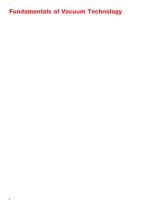
Fundamentals of Vacuum Technology
Open the catalog to page 3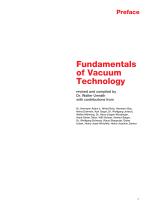
Fundamentals of Vacuum Technology revised and compiled by Dr. Walter Umrath with contributions from Dr. Hermann Adam †, Alfred Bolz, Hermann Boy, Heinz Dohmen, Karl Gogol, Dr. Wolfgang Jorisch, Walter Mönning, Dr. Hans-Jürgen Mundinger, Hans-Dieter Otten, Willi Scheer, Helmut Seiger, Dr. Wolfgang Schwarz, Klaus Stepputat, Dieter Urban, Heinz-Josef Wirtzfeld, Heinz-Joachim Zenker
Open the catalog to page 4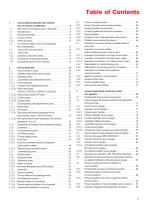
Vacuum physics Quantities, their symbols, units of measure and definitions . . . . . . . . . . . . . . . . . . . . . . . 9 Basic terms and concepts in vacuum technology . . . . . . . . . . . . 9 Atmospheric air . . . . . . . . . . . . . . . . . . . . . . . . . . . . . . . . . . . . . 13 Gas laws and models . . . . . . . . . . . . . . . . . . . . . . . . . . . . . . . . 13 Continuum theory . . . . . . . . . . . . . . . . . . . . . . . . . . . . . . . . . . . 13 Kinetic gas theory . . . . . . . . . . . . . . . . . . . . . . . . . . . . . . . . . . . 13 The pressure ranges in vacuum technology...
Open the catalog to page 6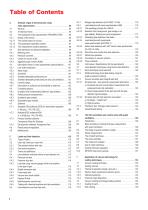
Table of Contents 4. Analysis of gas at low pressures using mass spectrometry . . . . . . . . . . . . . . . . . . . . . . . . . . . . . . . . . 95 4.1 General . . . . . . . . . . . . . . . . . . . . . . . . . . . . . . . . . . . . . . . . . . . 95 4.2 A historical review . . . . . . . . . . . . . . . . . . . . . . . . . . . . . . . . . . . 95 4.3 The quadrupole mass spectrometer (TRANSPECTOR) . . . . . . 96 4.3.1 Design of the sensor . . . . . . . . . . . . . . . . . . . . . . . . . . . . . . . . . 96 4.3.1.1 The normal (open) ion source . . . . . . . . . . . . . . . . . . . . . . . . . ....
Open the catalog to page 7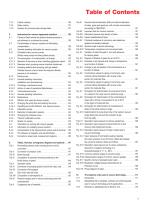
Optical coatings . . . . . . . . . . . . . . . . . . . . . . . . . . . . . . . . . . . . 136 Glass coating . . . . . . . . . . . . . . . . . . . . . . . . . . . . . . . . . . . . . . 137 Systems for producing data storage disks . . . . . . . . . . . . . . . 137 8 Instructions for vacuum equipment operation . . . . . . . . . . 139 8.1 Causes of faults where the desired ultimate pressure is not achieved or is achieved too slowly . . . . . . . . . . . . . . . . . . 139 8.2 Contamination of vacuum vessels and eliminating contamination . . . . . . . . . . . . . . . . . . . . . . . . . . . . . ....
Open the catalog to page 8
Table of Contents 10.4 Tables . . . . . . . . . . . . . . . . . . . . . . . . . . . . . . . . . . . . . . . . . . . 176 10.4.1 Basic SI units . . . . . . . . . . . . . . . . . . . . . . . . . . . . . . . . . . . . . 176 10.4.2 Derived coherent SI units with special names andsymbols . . 177 10.4.3 Atomic units . . . . . . . . . . . . . . . . . . . . . . . . . . . . . . . . . . . . . . 177 10.4.4 Derived noncoherent SI units with special names and symbols . . . . . . . . . . . . . . . . . . . . . . . . . . . . . . . . . . . . . . 177 11. 11.1 National and international standards and...
Open the catalog to page 9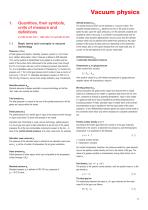
Quantities, their symbols, units of measure and definitions (cf. DIN 28 400, Part 1, 1990, DIN 1314 and DIN 28 402) Basic terms and concepts in vacuum technology Pressure p (mbar) of fluids (gases and liquids). (Quantity: pressure; symbol: p; unit of measure: illibar; abbreviation: mbar.) Pressure is defined in DIN Standard m 1314 as the uotient of standardized force applied to a surface and the q extent of this surface (force referenced to the surface area). Even though the Torr is no longer used as a unit for measuring pressure (see Section 10), it is nonetheless useful in the interest of...
Open the catalog to page 10
Vacuum physics Avogadro’s number (or constant) NA indicates how many gas particles will be contained in a mole of gas. In addition to this, it is the proportionality factor between the gas constant R and Boltzmann’s constant k: R = NA · k Derivable directly from the above equations (1.1) to (1.4) is the correlation between the pressure p and the gas density ρ of an ideal gas. In practice we will often consider a certain enclosed volume V in which the gas is present at a certain pressure p. If m is the mass of the gas present within that volume, then m ρ = --V The ideal gas law then follows...
Open the catalog to page 11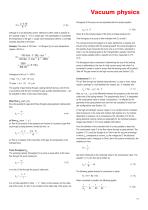
throughput of this pump can be expressed with the simple equation Although it is not absolutely correct, reference is often made in practice to the “quantity of gas” p · V for a certain gas. This specification is incomplete; the temperature of the gas T, usually room temperature (293 K), is normally implicitly assumed to be known. Example: The mass of 100 mbar · l of nitrogen (N2) at room temperature (approx. 300 K) is: where S is the pumping speed of the pump at intake pressure of p. (The throughput of a pump is often indicated with Q, as well.) The concept of pump throughput is of major...
Open the catalog to page 12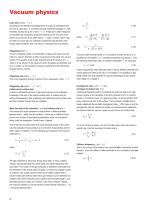
Vacuum physics Leak rate qL (mbar · l · s–1) According to the definition formulated above it is easy to understand that the size of a gas leak, i.e. movement through undesired passages or “pipe” elements, will also be given in mbar · l · s–1. A leak rate is often measured or indicated with atmospheric pressure prevailing on the one side of the barrier and a vacuum at the other side (p < 1 mbar). If helium (which may be used as a tracer gas, for example) is passed through the leak under exactly these conditions, then one refers to “standard helium conditions”. Outgassing (mbar · l) The term...
Open the catalog to page 13All Leybold catalogs and technical brochures
-
Full Line Catalog
1046 Pages
-
GRAPHIX Series
2 Pages
-
DRYVAC Energy Saver
2 Pages
-
DRYVAC PowerBoost
8 Pages
-
DRYVAC SERIES
5 Pages
-
Mechanical Vacuum Systems
8 Pages
-
Renewable Energies
6 Pages
-
Coating Technologies
8 Pages
-
Product Overview 2019
24 Pages
-
Fundamentals of leak detection
49 Pages
-
Vacuum Pumps
6 Pages
-
SmartCheck
4 Pages
-
LEYASSIST
2 Pages
-
Ion Getter Pumps
6 Pages
-
Vacuum Measurement - Sensors
8 Pages
-
PHOENIX 4 Leak Detector
8 Pages
-
Multi Inlet TURBOVAC i
8 Pages
-
SOGEVAC NEO
8 Pages
-
Food & Packaging
36 Pages
-
Product Overview 2018
24 Pages
-
Full Line Catalogue 2018
980 Pages
-
COMBIVAC Series
2 Pages
-
PHOENIX Series
8 Pages
-
COOLPOWER
2 Pages
-
DIJ - Oil Diffusion Pumps
4 Pages
-
RUVAC® WH / WHU Roots Pumps
8 Pages
-
DRYVAC Systems
6 Pages
-
CVS Central Vacuum Stations
4 Pages
-
CLAWVAC
6 Pages
-
VACUBE
12 Pages
-
ECODRY plus
8 Pages
-
TRIVAC T
6 Pages
-
Oil Sealed Vacuum Pump
194 Pages
-
Cryogenics
8 Pages
-
Rotary Vane Pumps
8 Pages
-
Flat Panel Display
12 Pages
-
Research & Development
12 Pages
-
Coating Applications
8 Pages
-
TURBOVAC i
12 Pages
-
SOGEVAC SV 16 - 25 D
2 Pages
-
SOGEVAC SV 10 B - SV 120 B
4 Pages
-
SOGEVAC SV 300 B
4 Pages
-
COOLVAC
6 Pages
-
Turbomolecular Pump System
6 Pages
-
UNIVEX
8 Pages
-
Diffusion Pumps
4 Pages
-
TURBOVAC iX
12 Pages
-
Fluid entrainment pumps
8 Pages
-
MAG digiLine
4 Pages
-
RUVAC WA(U) / WS(U)
4 Pages
-
SOGEVAC SV10 B - SV 120 B
4 Pages
Archived catalogs
-
PHOENIXL 300
6 Pages
-
Oil-free Scroll Vacuum Pumps
4 Pages
-
ATEX Vacuum Pumps
6 Pages












































































